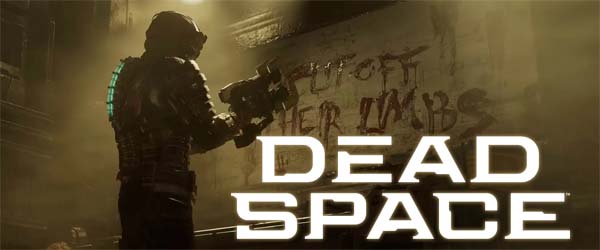
I'm gonna be perfectly honest with you right up front: I'm coming into this review with a negative bias. This is a remake that does not need to exist. Dead Space is only 10 years old, is an HD game that still looks fine. It is designed around gameplay conventions that are still standard practice today, and so the original still holds up well, outside of some mildly-dated presentation. I get the desire to remake or re-imagine older games that actually are dated, like Resident Evil 2 or Final Fantasy VII, which were both completely redesigned with modern gameplay conventions and (in especially in the case of Final Fantasy VII) bold new creative and narrative decisions. I would also understand the desire to go back and take another stab at more recent games which are really good, but which may have been virtually unplayable due to technical problems. Fallout: New Vegas comes to mind.
But this recent fad of rote remasts or remakes of PS3-era games that were already highly-polished and still modern-feeling (and thus hold up well today) just feels like lazy, cynical cash-grabs to me. Games like Dead Space, The Last of Us, and Mass Effect just feel like completely unnecessary remakes -- especially if they're going to be direct recreations of the original with little-to-no creative liberty. Heck, even the Demon's Souls remake feels unnecessary. I would much rather than Sony and FromSoft just release a digital version of the PS3 game on the PS4 and PS5 storefronts and keep the servers going. Maybe even patch the PS3 game with some of the ease-of-use features that were added for the PS5 remake. I'm still on the fence about Silent Hill 2 and Resident Evil 4, since those remakes might take enough creative liberty to justify their existence (assuming they don't shit the bed in doing so). As such, I did not buy this remake of Dead Space retail. I bought a used, second-hand copy in order to save a few bucks and to not give money to EA (and so as not to seem to give implicit support for this trend of unnecessary remakes).
Coming off of Callisto Protocol, Dead Space feels like a masterpiece.
All that being said, having just recently come off of playing through The Callisto Protocol, the difference is night-and-day. This Dead Space remake is, by far, the much better game. It's a good remake of a good game, and it's a good survival horror game in its own right.
Mostly how I remember it
Dead Space is a pretty straight-forward, by-the-numbers recreation of the original game, with only a few creative liberties taken. It's still a 3rd person shooter built around the challenge of shooting off the limbs of zombies and monsters instead of aiming for the center of mass or going for head shots. The story, mission structure, map, and many set pieces will all be completely recognizable to anyone who played the original game, even though some things here and there might be a little different.
As such, pretty much any review of the original Dead Space still holds mostly true here. All the things that I liked about the original game are still present. Unfortunately, I never reviewed the first Dead Space on this blog, so I can't just link you to that. I'll have to just summarize my feelings here.
Isaac is fully voiced and has more agency compared to the original.
The enemies are threatening, and the combat is challenging. The non-traditional weapons, combined with kinesis and stasis and creative enemy design, provide a lot of variety and strategy in combat that goes far beyond just "shoot bad guy in the head". The setting and lighting really help to sell the sci-fi horror aesthetic. The in-universe, diegetic, holographic interface holds up well and never pulls the player out of the immersive environment. The Ishimura itself still feels like a believable, functional place. The story is derivative, cliché, and cringe-worthy in some parts, but I do like the religious undertones and parody of Scientology. [More]
fd3c4399-577e-4a0d-b05d-256753797daf|1|5.0
Tags:Dead Space, Electronic Arts, Motive, Visceral, remake, horror, survival horror, science fiction, shooter, zombie, necromorph, dismemberment, religion, Scientology, Unitology
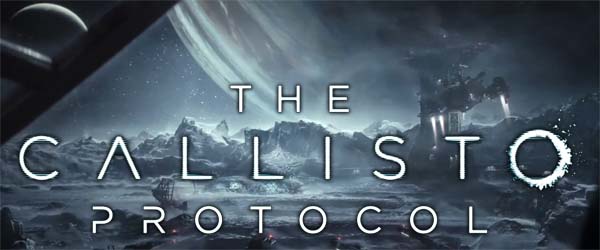
I saw a lot of social media posts in the days after Callisto Protocol's release complaining about the game being awful. Some said it was buggy and riddled with performance issues. Others said it was just a bad game, and would be bad even if it were stable.
I didn't experience a lot of the technical issues (on PS5) that others were reporting. But I also didn't start playing till later that weekend, so had the benefit of the day-1 patch. Maybe that fixed a lot of the technical complaints? Yeah, there were still some lingering technical issues, but they were mostly nagging problems that I could look past.
So I went through most of the first half of the game thinking "This ain't so bad." It wasn't very good either. But it seemed like it was being unfairly maligned. It's Dead Space, but just ... not good.
Callisto Protocol is borderline plagiarism of Dead Space, but not a very good copy.
But as I got into the middle of the game's campaign, my opinion began to change. The issues and frustrations mounted until they boiled over in the game's first boss fight (which doesn't happen until more than halfway through the campaign). Callisto Protocol is just not very well designed or though-out. It suffers at fundamental levels of gameplay design.
Space Zombie Punchout
Callisto Protocol's problems start with the awful melee and dodge system -- which is kind of the whole gimmick of the game. Instead of pressing a button to trigger a dodge, the character automatically dodges left or right if the player is pressing the left analog stick left or right (respectively when the enemy makes an attack. The character will also block if the player is pressing backwards when the enemy attacks.
It's a system that feels more like Mike Tyson's Punchout than any action shooter I've ever played. But where Punchout is a boxing game that features a stationary opponent ducking left or right to dodge the punches of a single opponent lined up directly in front of you, Callisto Protocol is ... not that. The character in Callisto Protocol is ambulatory, and attempting to navigate an environment while also fighting multiple enemies at both melee and at range.
I could not get the hang of which direction I should be dodging -- except against bosses.
I found it very difficult to get the hang of the melee combat -- at least outside of boss fights. Strangely, the boss fights seemed to have the most clearly telegraphed attacks and reliable dodging. Outside of boss fights, however, enemies are frequently zombie-like monsters that rush at the player and shamble around, making it difficult to read their movements. As such, I never know which direction to dodge. And even when I do seem to correctly dodge, I sometimes take damage anyway, which leads to the next big problem. Pretty much every time I had to engage in melee combat, I would die and have to retry.
[More]
7280ae0d-0d27-4b73-bd65-d0a7184a805a|2|3.0
Tags:The Callisto Protocol, Striking Distance Studios, Krafton, quicktime event, melee, dodge, science fiction, horror, shooter, zombie, arcade, Dead Space
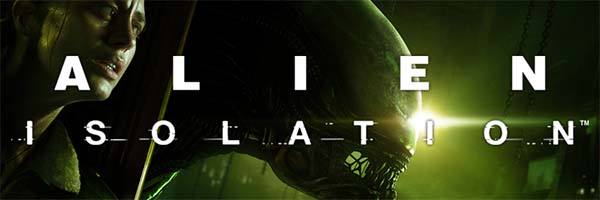
There is no shortage of games that have been based on the Aliens movie. Heck, even Starcraft is basically an unlicensed Aliens versus Predator game! But games that have the Aliens name on them have a very shaky track record. Some have been good. Others have been absolutely terrible. Last year's highly-anticipated Aliens: Colonial Marines (by Gearbox) just might have been the worst of the bunch, and left a very sour taste in fans' mouths.
But this new game is different. It's developed by Creative Assembly (of Total War fame), and its actually based on the first film of the franchise: Alien (singular).
Where the sequel Aliens is a high-octane sci-fi action film about a battalion of macho space marines being put in their place by a hive of aggressive xenomorphs, Alien is a much slower and more cerebral sci-fi horror movie about a group of space truckers who get picked off one by one by a single hostile xenomorph. This shift in focus from the action-packed sequel to its smarter horror predecessor is a welcome change for the franchise and a breath of fresh air in AAA game development. For over a decade now, horror has been on the decline when it comes to big-budget games. This is thanks in part to Resident Evil 4, and the only major horror game that's come out since has been Dead Space. It seemed that the slower, more cerebral style of horror that was popular during the PS1 and PS2 era (with games like Resident Evil and Silent Hill) was all but dead in mainstream gaming.
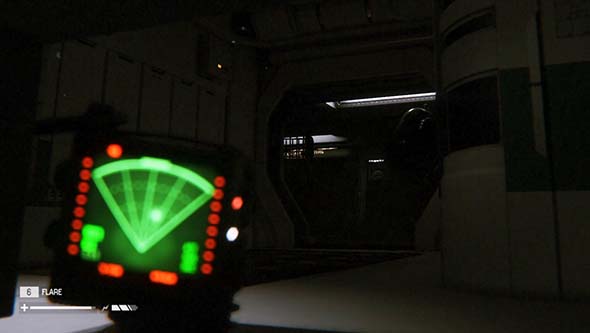
The motion tracker has a nifty control that lets you change focus between the tracker and the background environment.
So does Alien: Isolation live up to the hype and breath new life into the classic genre of survival horror?
... [More]
8984569a-40c8-4028-ae85-daf24bd13be6|3|5.0
Tags:Alien Isolation, Alien, the Creative Assembly, Ripley, Sigourney Weaver, Ridley Scott, Dead Space, science fiction, horror, survival horror, movie tie-in
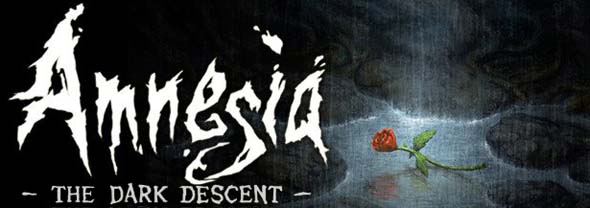
Since Silent Hill Downpour failed miserably to scratch my survival horror itch, I’ve been looking for something else to fill that niche. I picked up Amnesia: the Dark Descent on a Steam sale for pocket change, and am very glad that I did.
Mainstream game companies don’t seem particularly interested in releasing good survival horror games. It’s a very niche market and difficult to find mass-market appeal. Modern horror games mostly ape off of Resident Evil 4 by being designed as an action shooter first, and survival horror game second (if at all). The genre is dominated by fast-paced "boo"-scare games like Dead Space and F.E.A.R., and gone are the days of the deliberately-slow-paced psychological games like Silent Hill 2 and Fatal Frame. The "survival" element has mostly fallen away since resource management is widely regarded as too tedious, and the "horror" is usually just represented with difficult combat.
But where mega-publishers and AAA developers have dropped the ball, the Indie market filled in the gap 3 years ago (Sept 2010) with Amnesia: the Dark Descent.
Amnesia goes to the opposite extreme as Resident Evil 4 and Dead Space. This game is not an action game. [More]
dcd7f8cf-6f87-43f5-bf47-23ebe40b5ba4|3|4.7
Tags:Amnesia: the Dark Descent, Frictional Games, Steam, PC, H.P. Lovecraft, review, steampunk, survival, horror, survival horror, macabre, amnesia, sanity, Silent Hill Downpour, Silent Hill Shattered Memories, Dead Space, Resident Evil 4, Eternal Darkness, checkpoint, indie gaming
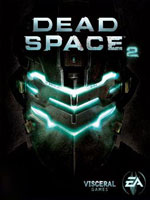
The first Dead Space really impressed me. A lot. I think it was released in the same year as Grand Theft Auto IV and Metal Gear Solid 4. And Dead Space ended up being my favorite game of that year. Of course, part of that was because I was actually able to finish Dead Space by the end of the year, and Grand Theft Auto took longer. In hindsight, GTA IV was probably better. The first Dead Space game perfectly captured the feel of the classic science fiction horror film Alien, but with a bit more action.
The attention to detail was astounding, and the Ishimura just felt so functional! Like a real spaceship. Other than the artificial gravity, the Ishimura seemed like something you might see on a Science Channel special about hypothetical space mining craft The layout and organization of the ship just made sense, and the use of holographic displays as the game’s HUD and interface was brilliant design. And the space setting made the clunkiness of the character's movements actually work thematically - even though he still performed better than the characters from Resident Evil 4 and 5 anyway!
The concept of dismembering enemies to kill them was novel and added a unique dynamic to the otherwise stale shooter formula. On top of that, every one of the improvised engineering tools that were offered as weapons kicked ass (only, ironically, the military pulse rifle felt weak). And the boot stomp! Oh, the boot stomp!
Dead Space hit a gaming sweet spot for me that would be very difficult to improve upon in a sequel. Everything about it just felt so right – except that asteroid shooter segment – that part blew big time. [More]
5b83cecd-b5a5-478e-a26f-be84d2239547|1|5.0
Tags:Dead Space, Dead Space 2, Isaac Clarke, necromorph, EA, EA Redwood, Visceral Games, horror, science fiction, action, shooter, PS3, Silent Hill 3, Demon's Souls, Resident Evil 4, Resident Evil 5, review
|

| 12 | | | | | | | 60 | | 11 | | | | | | | 55 | | 10 | | | | | | | 50 | | 09 | | | | | | | 45 | | 08 | | | | | | | 40 | | 07 | | | | | | | 35 | | 06 | | | | | | | 30 | | 05 | | | | | | | 25 | | 04 | | | | | | | 20 | | 03 | | | | | | | 15 | | 02 | | | | | | | 10 | | 01 | | | | | | | 05 |
|